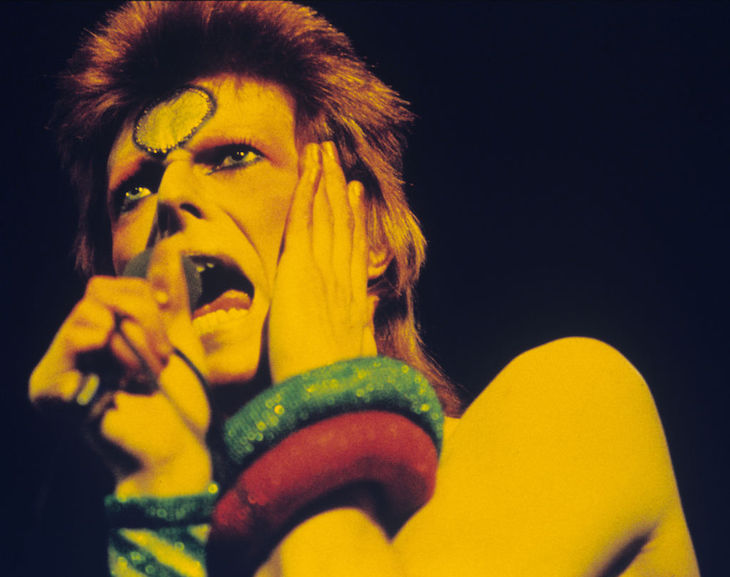No one has a bad word to say about David Bowie, but it’s about time they did. The pop star’s legion of fans depict him as the Alpha and the Omega, the First and the Last, the Beginning and the End. Few dare to question the awesomeness of His Grace, the Thin White Duke.
Almost ten years after his death, the cloying adulation for David Jones – could he have had a less cool name? – shows no sign of abating
Almost ten years after his death, the cloying adulation for David Jones – could he have had a less cool name? – shows no sign of abating. This week marks another anniversary: November 14, 1969, was when one of Bowie’s most famous albums, Space Oddity, hit the shelves. Cue another round of infatuated and over-the-top headlines about Bowie’s greatness.
Anyone who fancies bathing in the glow of the latest Bowie love-in should head over to east London where the V&A has devoted a slice of prime real estate to a permanent exhibition honouring his Holiness’s preposterous taste in outerwear, along with a nerdish reference library of Bowie-related tedium. Those making the pilgrimage should take note; many of the holy relics are behind glass, meaning there will be no touching the hem of any robes.
The syrupy sycophancy laid at Bowie’s platform-booted feet is especially prevalent amongst pop stars that came to prominence in the 1980s and 90s. Jim Kerr of Simple Minds described Bowie as a ‘musical magician, a soothsayer, a prime mover’. Suede’s Brett Anderson explains how Bowie’s songs ‘became the furniture of mine and so many people’s lives’. Really?
Oh, how the fading stars of yesteryear love to out-fawn each other, bleating the same boring clichés about how their hero ‘changed everything’. To them, Dave Jones wasn’t just a fluffy, overwrought pop singer; he was avant-garde’s ground zero, a poster boy for po-faced pseuds and a cultural lightning rod for everything that followed.
The level of obsequiousness is frankly vomit-inducing. Gary Numan once praised Bowie’s ‘otherworldly, androgynous visage’ before promptly falling out with him after Bowie accused him of trying to steal his image, which takes me neatly to Jones’s ghastly taste in slap.
I have no problem with male rockers appearing in makeup, but if you’re going to powder your face at least do it with humour and aplomb. When US rockers Kiss caked themselves in what looked like North Sea oil, and called themselves silly names like ‘Space Ace’ and ‘Cat-man’, we weren’t supposed to infer anything more than that they had no shame.
And yet whenever Bowie raided his mum’s make-up box the tawdry results were treated as major cultural moments. I’m sorry, but applying rouge and wearing sequins doesn’t make you an icon of androgyny even if you were one of the first to do so. I never saw Bowie as androgynous; he just looked like a confused teenager with body issues.
Bowie’s sometime keyboard player Rick Wakeman used to dress up in spangly floor length capes and wizard’s attire during his tenure with Yes, but I don’t remember musos stroking their chins and calling him a cultural icon. Rick was simply ‘avin a laugh and we were all in on the joke. Similarly, we all giggled when Leo Sayer painted his face white and applied ruby lipstick and a single tear because dressing up as a winsome pierrot was seen as deeply uncool. And yet when His Bowieness applied the same mawkish face paint for the cover of Scary Monsters, we were supposed to marvel at his willingness to push boundaries. I mean please.
Whenever I look at photos of Ziggy Stardust I don’t see an icon of 70s cool, but an undernourished bloke with a dodgy orange mullet, a stripy onesie and red plastic lady-boots. Frankly, Bowie wasn’t a patch on that other sequin-studded Stardust also known as Alvin.
Herein lies the mystery of Bowie’s appeal: even now he manages to inspire a haughty kind of earnestness amongst his more priggish fans. It was only in later life that Bowie began to laugh at his earlier drug-fuelled incarnations, but I’m not sure he ever took himself as seriously as those obsessive fans who still imbue every silly haircut, pretentious utterance and incomprehensible ditty with almost spiritual significance.
These misguided fools have been infected by a sort of Bowie derangement syndrome whereby they remain blind to their hero’s shortcomings. Don’t they realise that Bowie lifted his ‘unique’ vocal style from naff 1960s crooner Anthony Newley? And have the cool kids conveniently erased from their memory The Laughing Gnome, surely Bowie’s most towering achievement?
Some have risked opprobrium for daring to speak out. Keith Richards, no less, once described Bowie as ‘all pose. It’s all fucking posing. It’s nothing to do with music. He knows it, too’. This surely explains why every 80s poseur claims Bowie as their own.
The only Bowie period I am able to stomach is the one every diehard fan balks at. But then again the early 80s Let’s Dance album was produced by Nile Rogers, a musician who really knew how to push boundaries.
It’s interesting that Bowie has remained popular with progressives despite his questionable politics. Do they not care that he once told an interviewer that he believed ‘very strongly in fascism’? Or what about the fact that, in an interview with Playboy magazine in the 1970s, Bowie claimed ‘Adolf Hitler was one of the first rock stars’.
In an era that purports to hear dog whistles that aren’t even being blown, lefty aesthetes seem oddly indifferent to a pop star unafraid of blowing his own cover.







Comments